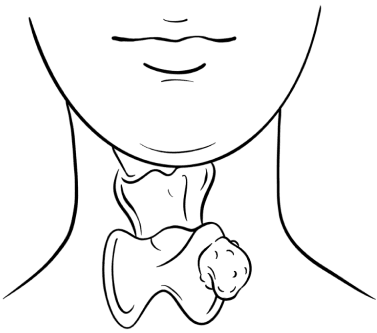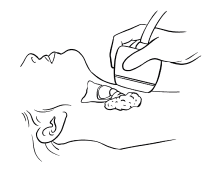The thyroid gland is a butterfly-shaped gland located at the front of your neck, near the base of your throat. Though a small gland, the thyroid has a big responsibility in maintaining your body’s regular metabolism.
It makes the thyroid hormones that help your body to use energy, stay warm, and keep your brain, heart, muscles, and other organs working as they should. Your thyroid gland is essential to life.


A thyroid nodule is a solid or fluid-filled lump (unusual growth) in the thyroid gland. It is a very common entity in the United States, affecting around 20 million people. 1
Fortunately, most thyroid nodules are not cancerous (benign) and do not cause any problems. However, some nodules can become enlarged and lead to unwanted symptoms.

Swelling at the Base of the Neck

Hoarse Voice

Coughing

Difficulty Breathing

Dizziness

Your doctor can detect a thyroid nodule by examining your neck and feel your thyroid gland.

A thyroid function test is a blood test to measure the level of thyroid hormones (T3 / T4) and thyroid-stimulating hormones within the bloodstream.

Ultrasound is the most commonly used imaging modality to evaluate your thyroid. It uses sound waves to produce an image of your thyroid gland on the screen. It is also used to guide procedures such as fine-needle aspiration biopsy or RFA.

A fine-needle aspiration biopsy takes samples from your thyroid nodule for microscopic evaluation. It is the most accurate test to determine whether a nodule is cancerous or benign.3

A thyroid scan uses nuclear medicine imaging to evaluate the functions of your thyroid gland.
Discuss your problems with an RFA-trained Thyroid Specialist. You could end your pain with this incision-free, non-surgical procedure.

If your thyroid nodule is benign (non-cancerous) and not causing symptoms, your doctor may suggest simply watching your condition with regular physical and ultrasound examinations. You may never need treatment if your benign thyroid nodule remains unchanged.

Your doctor may prescribe antithyroid medication for you if your thyroid is making too much thyroid hormone than your body needs. These drugs block the formation of thyroid hormone by the thyroid gland.

Your doctor may prescribe hormone therapy for you if your thyroid cannot make enough thyroid hormone to sustain your body's needs. The goal is to replicate your normal thyroid function closely.

All or part of your thyroid gland can be surgically removed if the nodule is too large and symptomatic. some patients develop hypothyroidism following partial thyroid surgery, requiring lifelong medication. This is especially true if you had your entire thyroid gland removed.
You deserve to be comfortable and have peace of mind from your thyroid nodules. Today, there are treatment options that are far less invasive than removing your thyroid!
Important Safety Information / Disclaimer
Patients should talk to their doctor to decide if STARmed Thyroid RFA is right for them. Patients and doctors should review all available information on non-surgical and surgical options and associated risks in order to make an informed decision. Individual results may vary, testimonials are not claimed to represent typical results. All testimonials are from real patients, and may not reflect the typical patient’s experience, and are not intended to represent or guarantee that anyone will achieve the same or similar results.
The information on this site is not intended or implied to be a substitute for professional medical advice, diagnosis or treatment. All content, including text, graphics, images and information, contained on or available through this web site is for general information purposes only.
Registered trademarks of TaeWoong Medical USA or their respective owners.
Indication
The VIVA Combo RF Ablation System and star RF Electrode are intended for use in percutaneous and intraoperative coagulation and ablation of tissue.
Contraindications
There is a risk that error may result due to the radiofrequency current on patients who have pacemakers and other active implants. Do not use the radiofrequency lesion generator and electrode on these patients.
Complications:
The following types of complications may result due to the use of the radiofrequency lesion generator and electrode.
– Tumor recurrence
– Burn due to the over-heating of the the surgical equipment
– Dangerous situation due to the unskilled equipment control
– Cross-infection or complications due to the re-use of the inappropriate electrode
– Ascites/diarrhea
– Bleeding of the coagulated part
– Ventricular fibrillation
– Weakness of liver functions
– Symptoms after RFA treatment includes (abdominal) pain, fever, nausea, headache, right shoulder joint pain and chest discomfort might occur
You are taking a big step by exploring your treatment options. You are not alone. Many other people were searching for the same answers too. Many of these individuals chose RFA.

We are working hard to bring this treatment closer to you.
You are taking a big step by exploring your treatment options. You are not alone. Many other people were searching for the same answers too. Many of these individuals chose RFA.
Showing 330+ search results